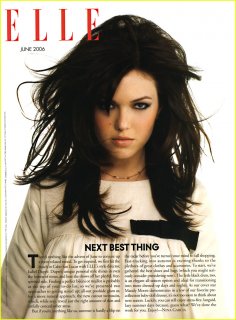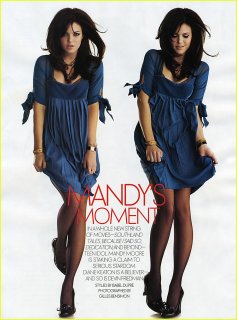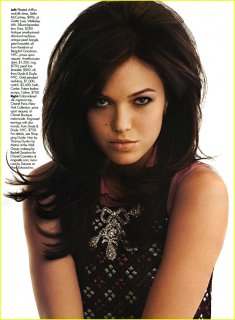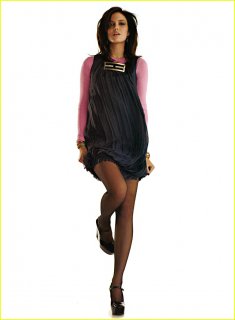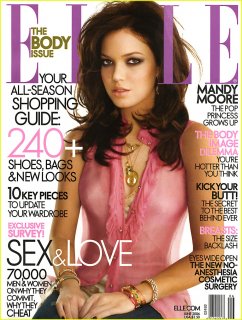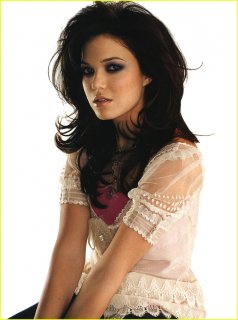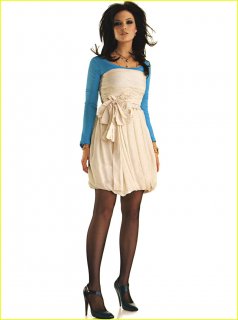TOhollabackgirl
Member
- Joined
- Jul 7, 2005
- Messages
- 32
- Reaction score
- 0
in the scan, where are those sunglasses from? they're delish.
 )
)Moore seems to buy her own non-celebrityness so genuinely, you start to believe her. Maybe she's just a regular 22-year-old actress/model type strolling the steroidally consumerist streets of SoHo like all the other actress/model types here, drinking coffee and window-shopping. There is something weirdly normal about her, tucked into her North Face parka with the faux-fur collar ("I could never wear fur, never"), her striped scarf trailing over her shoulder. Maybe it's that Orlando, Florida, breeding. Or that the Mandy Moore persona hasn't yet fully penetrated the grown-up world—her cultural input has thus far been mostly via bubblegum pop and pubescent tearjerkers such as A Walk to Remember, released in 2002. Maybe it's her normal human proportions; she doesn't have the extreme alien beauty that supermodels and Uma Thurman have.
"Mandy is obviously drop-dead gorgeous," says Diane Keaton, who plays her mother in the upcoming film Because I Said So. "She's America's beautiful girl, with this open face and this open heart. But she looks like a regular person. Like a really, really pretty regular person. I couldn't take my eyes off her." (Continue reading after the jump, more scans in the gallery)(As long as we're on the topic, I should stop the tape here on Mercer Street to give Moore a onceover and see if Tom Everett Scott, her Because I Said So costar, was right when he told me she's "even more attractive in person": heart-shape lips and flawless skin, yes; but also, at certain angles, an unnervingly accurate vision of what she looked like at age 13.)
So forget that she dated the tennis star Andy Roddick and often appeared on TV courtside yelling her head off; forget that, according to his recent interview on Howard Stern, she was deflowered by celebrity lothario Wilmer Valderrama, a claim she says is "utterly tacky, not even true, and it hurt my feelings because I like him"; and forget that she is now dating one of Hollywood's great young hopes, the actor/director/smarty-pants Zach Braff. Counter to all that evidence, I begin to feel that it's just me and this cool regular girl foraging for vintage clothes on a brisk early-spring day.
Then, at a boutique in SoHo, the disturbingly blank face of an old man appears in the window. He puts a big black lens to his eye and starts shooting. "Is that guy taking your picture?" I say. "Yep," she says, without looking up. Who knows how the guy picked up on the scent of Mandy Moore. Or how the second paparazzo, a woman, gets word and comes running. But they have hustled over here because they believe that pictures of Moore shopping are worth something (she's a celebrity!), and while she is kind of annoyed (crestfallen, in fact: "They just ruin your day," she says), she isn't surprised. She exits the store and walks among the genuinely anonymous actress/model types with a sense of purpose. She does not alter course, turn heel and run, or even put on her sunglasses: She is ignoring the paparazzi the way you'd ignore your spastic brother in the backseat on a long car trip. But this ghostman, this tired old paparazzo with a New York accent and flat feet giving labored chase through SoHo, is most likely the harbinger of things to come for our heroine. The ghost of celebrity Christmas future, yelling, "Miss Moo-ah, Miss Moo-ah, can you give me just one nice shot?"
The occasion for Mandy Moore being on the cover of this magazine is her launch into adult-land. The booster rockets of teenage fame have been jettisoned. The film American Dreamz, in which she plays a twisted reality-TV contestant judged by a panel including the President of the United States, has recently been released. And then in quick succession: the epic ensemble Southland Tales and the romantic comedy Because I Said So. She's here in New York filming an independent movie called Dedication with Billy Crudup and Tom Wilkinson—not exactly like being on tour with the Backstreet Boys.
Keaton, a woman with some perspective on the arc of an actress's career, predicts this for Moore: "You meet someone like Sarah Jessica Parker, who is a huge celebrity and a pro at being a celebrity—she has adapted her life to manage that in most graceful fashion. Well, Mandy's not quite there yet. But this will be something that her life will have in it. And it's a much bigger responsibility even than for me back in the Annie Hall days. It's more powerful now. She's a celebrity on the cusp of huge celebrity."
I have read that Moore loves Jon Stewart. Like, her favorite thing to do is sit at home and watch The Daily Show. It's part of her purported jammies lifestyle. Not Hugh Hefner silk pajamas; more like the footy kind. She doesn't really drink. She has never done a drug. And today, over breakfast in the West Village, she is at pains to explain this is not just hype. She really does love to get cozy.
"I'm a homebody," she says with die same relish that 50 Cent might tell you about getting capped. "When I'm not working I want to be in, like, comfy clothes watching TiVo."
But let's backtrack: Jon Stewart and Zach Braff. I mean, don't take this the wrong way, Mandy, but, like, if you ran Zach Braff through the FBI aging machine, wouldn't you get Jon Stewart?
"I guess I have a type!" she says. "I like a good Jewish boy. With a sense of humor."
"Having read up on your relationship in the gossip rags, I was expecting to see your $250,000 engagement ring. What up with that?" I say.
"What up with that? I haven't seen it either."
"What about that website that claims to link to the Tiffany registry for your wedding?"
"That's what my mom saw in the newspaper. That's when she was like, 'These people are crazy!'"
"They supposedly had Brad Pitt's registry as well."
"Oh wow, then we're in good company."
"Do you believe in marriage?"
"Oh yeah. My parents were high school sweethearts. So I have that example."
"Hollywood doesn't seem to produce that many—"
"Successful marriages? I know. I don't know why that is."
"I think some people might get married realizing that—"
"It's not going to be forever? But I know that when I get married, I want to know. I don't want to go in with the mentality, Well, maybe this will work and maybe it won't."
"Have you seen your man since you've been in New York?"
"Zach was just here visiting. We stayed at the Mercer Hotel because I'm staying in this small apartment; like, 700 square feet. I told him it's only got a double bed. He was like: 'Mercer.'"
"Dude, that's not small—250 square feet is small."
"That's what my friends from New York say. Anyway, he's coming back this summer to film his new movie in Jersey. I don't totally get the thing Zach has about his hometown. I don't feel that way about Orlando. Maybe because Orlando doesn't have that tight sense of community."
I don't think that's it. This woman on the cusp of mega-celebrity (Keaton, paragraph five) was born in New Hampshire and moved to Florida at six weeks old, when her father, a pilot for American Airlines, was relocated there for work. She lived in Orlando until she was about 14, when she was discovered by the FedEx man: Her parents had rented a recording studio so she could make a demo to send off to wherever these things are sent and become part of what was then the preburgeoning teen-pop movement. While she was recording, a guy who worked for FedEx heard her sing, told her she was phenomenal, and called his friend who signed urban artists for Epic. ("It's funny, because there's nothing urban about me," she says.) So the Epic guy flew down to hear her and gave her a contract on the spot. It's not the only time someone, smitten with her voice, face—her entire pop-star package—has swept her away.
"The studio had me looking at Jessica Simpson," says Adam Shankman, who directed A Walk to Remember. "But I was driving up Laurel Canyon, I heard Mandy's song 'I Wanna Be With You,' and I thought, Who the hell is that little angel voice? I went to the Virgin record store, saw her face, and flipped out. I said, 'That's my girl.'"
That Moore's talents were manifest at age 14 is why she doesn't get Braff's hometown fetish. She was gone during those years when adultish longings hatch. Those of us who remain captive in our small teenage worlds tend to transfer our longings (loneliness, desire, beauty, friendship, sex) onto our hometowns, hanging them from the trees we grew up near and the houses of the first people on whom we had crushes, like Christmas ornaments, where they remain, powerful and sad, whenever we go back home. But Moore's whole world wasn't some suburban town. Her whole world was the actual whole world.
"I'm not a big, like, going out person," she says when she's asked about her clean-living ways. "I sort of, like, skipped over that whole phase in my life."
"What phase did you go to?" I say.
"I went to, like, adult phase."
People assume that what happens when a previously normal boy or girl becomes a teenage star is that he or she has his or her insides scraped out and replaced with pure, Styrofoam ambition. Maybe it's their own ambition or maybe it's their parents', but at 14, your drive is not to "express yourself." Conventional wisdom dictates that people develop their voices (writing, singing, acting, etc.) during the crucible years of struggle—while living in Hell's Kitchen or Silver Lake with three roommates, eating ramen noodles and going on 746 auditions a week. Teen stars skip the starving-artist phase.
"I came out when I was 14, singing songs about candy," Moore says. "I was told what to sing and how to sing it, and I felt like a puppet. I don't think people cared about me or what I wanted to do musically. It was more about: This is what sells records. I totally felt disposable."
When you hear Moore sing, even on the lighter-than-air, overproduced early records (So Real, 1999, and Mandy Moore, 2001), it's obvious why the FedEx man plucked her from obscurity: She has a clear, virtuoso, pliant voice with range. It's also apparent that her producers put her on the dial-a-voice program: Sometimes she sounds like Shania Twain, other times she has the meandering vocal show-offmess of a mini Mary J. Blige, and on, say, 2003's Coverage, she sounds more like what you'd get if you grafted Mariah Carey with Carol King. But there's always something, for lack of a less teen-poppy term, real that comes through. You can detect an actual person knocking around in all that market-tested production, even if it's not more than a faint SOS tapped out on prison bars.
"I saw A Walk to Remember before casting her," American Dreamz director Paul Weitz says. "A Walk to Remember wasn't.. .well, actually, I kind of liked her in it." Weitz goes on to say that, in Dreamz, she was capable of more than playing a version of her pop-star self: "I think she's able to handle a certain kind of comedy. She's able to go into sort of an extreme character without winking at the audience. She can play someone who's sociopathic incredibly well. I think it's because she seems like an incredibly nice, smart person. So it's fun for her to play the other side of the coin."
This is basically why Moore has an acting career. Somehow she's been able to emerge unscathed from the muck of teen culture. She's now acting like a young thespian just arrived from the starving-artist phase. She's dating a young Jon Stewart, not a young Donny Osmond. She went out and got a role in the independent movie Saved! (2004), a fairly risky, fairly controversial satire about Christian fundamentalists. And she was good. Her character was Mean Girls meets The Ten Commandments; you could feel her relief at getting to play a haughty b*tch instead of a sugary leukemia patient (Walk to Remember). She also played herself on Entourage last year, giving the public the opportunity to get used to the idea that Mandy Moore might be cool.
"I think Saved! was the beginning for me," she says. "It was the start of people saying, 'Hey, maybe she's a serious actress. Maybe she's in this for the long haul.' And once you have that feeling, doing work you're really proud of, you want more of it."
Moore's transformation is a sign that maybe it's time to rethink the legacy of teen pop. Like with just about every previous and subsequent youth-culture movement, it seemed pretty clear that the advent of bubblegum pop (Britney, Justin, Mandy, et al.) had been presaged in Revelations as a sign of the impending apocalypse. But at the very least, being put through the teen machine teaches you how to be an entertainer. How to sing, dance, do a satellite radio tour—how to be a professional by age 16. And how can we not be impressed by the ingenuity of these youngsters, emerging as they have into adulthood? Lindsay Lohan is proving herself pretty adept at keeping famous by changing her hair color. Lance Bass wants to be an astronaut. Britney Spears isn't in jail for welfare fraud. Jessica Simpson is a legitimate divorcee sex symbol. Justin Timberlake, The Mickey Mouse Club kid, made an excellent album four years ago, and now he's in a bunch of movies where he proves he can actually act. And then there's Moore, not simply cashing in her chips for the most extreme kind of fame available, but straining for transformation, to be creative, to challenge herself. Doesn't that restore your faith, if even the supposedly plasticized are actually yearning humans? Isn't that the kind of resilience they make biopics about? Can't you see the trailer: Moore telling her record company to screw off so she can go follow her heart? It's a triumph of the human spirit!
She may not do shots and dance on the bar at Hogs & Heifers, that supposed rite of passage of girls on their way to becoming America's sweetheart. But she does have a self-proclaimed vice: shopping. Moore is, as she says, addicted. Where will you find her on her days off in Manhattan? Perusing the vintage shops on the Lower East Side, or the more rarified climes of the Mayle Boutique in SoHo. But for someone so supposedly warped by compulsion, Moore on a buying spree is not what you'd expect. Here's how it goes :: She says, "I think I'll stop by A.P.C." Then she stops, barely stops, by A.P.C.
It's certainly possible things would have been different if I weren't in her company. That maybe she would have agonized, consulted, did the thing where you look over your shoulder to try to check out your own *** in the mirror-—or at least tried something on. But as it happens, Moore enters the store, unzips the parka, and takes one (1) turn through the aisles. She picks a few things off the racks :: an ochre sweater, a black knit wrapdress, a small cotton bag one might use for toiletries. She deposits them at the cash register, signs her AmEx slip, and breezes back out of the store without, as far as I can tell, uttering a single word. Probably the most painless shopping spree in SoHo since it was a bunch of warehouses.
Afterward, in a taxi, we discuss her future. Her singing career is up in the air. She's got almost an entire album written and ready to record, but she is still having the same arguments with her label she's had since she was 16.
"I don't know. It's depressing. Maybe it will come out this year? Maybe next? I think my label is expecting a poppier, mainstream-type thing from me. It's been so long since I was singing 'Candy' and driving in a green Beetle. But I know there's so much of, like, middle America that still thinks of me that way."
She is also, and you get the sense she pretty much always is, optimistic. You can't blame her, I guess; all that child-star sunshine has to have rubbed off on her somehow.
"If you're lucky, people are able to, like, go beyond your image," she says. "Like, Justin is an example. He's creating something that's his own. But I'm not really a celebrity like he is."
fashionyork said:I love her smile.
I love her sense of style.
And above it all i love that she looks so incredibly gorgeous and she isnt a stick. LOVEEEEEEEE it
